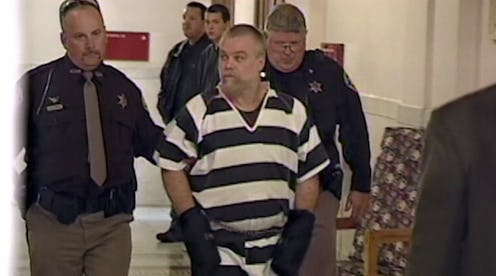News
This 'Making A Murderer' Update Is A Bombshell

Few docuseries in recent memory have been as popular as Netflix's Making a Murderer — after all, the convictions of Steven Avery and his nephew Brendan Dassey is a real-life drama that's still unfolding. On Wednesday, that drama gained a new layer of complexity. An In Touch report claimed there could be new information coming that could potentially exonerate Avery in the murder of photographer Teresa Halbach.
According to In Touch, hiring high-powered defense attorney Kathleen Zellner was a good move for Avery. Known for her heroic ability to exonerate the wrongly-convicted, Zellner is reportedly using state-of-the-art forensic analysis techniques to prove that Avery's DNA was planted on Halbach's car key. Zellner alleges that the RAV4 key was wiped down with a solvent and Avery's DNA was then placed onto it to frame him. (It should be noted that Manitowoc County sheriff's department has consistently denied any wrongdoing, and that Avery was found guilty by a jury.) According to In Touch, the tests Zellner is running can detect the presence of a solvent, making the case for Avery being framed all the stronger.
In addition to the aforementioned "key" evidence being reexamined, other forensic analyses are reportedly underway to prove that the blood found in Halbach's car — another piece of evidence used to convict Avery — was "significantly older than it should have been, meaning it was planted." Ever the high-baller, Zellner is taking no prisoners, so to speak. The In Touch report claims to have spoken to sources close to the attorney who told them she is not looking for a new trial for Avery — she wants his murder conviction vacated.
Wednesday's In Touch revelation was accompanied by an article from the Appleton, Wisconsin Post-Courier , which acquired 1,900 emails through a January request for information under Wisconsin state transparency laws about Avery, his nephew and supposed accomplice Brendan Dassey, and other emails containing the word "Netflix" or phrase "making a murderer."
The information that was published from the emails, while not as potentially scandalous as the new DNA evidence, provides important context on Avery and Dassey's lives in prison. The emails revealed that prison officials initially feared for Avery's safety after MaM's rise in popularity, and considered transferring him to an out-of-state prison. Despite their concerns, Avery allegedly told prison officials that he was unconcerned about the publicity, saying that "most inmates voice support of him and everyone has been very good to him," according to one email.
The article published after the email dump also revealed that Avery seemed "to relish to notoriety" he gained after the December premiere of MaM, according to Bill Pollard, former warden at Waupun Correctional Institution, where Avery is serving his sentence. Pollard, who has since been transferred to another facility, and other prison brass also denied both Avery's request to watch Making a Murderer and media requests to interview Avery, saying they didn't want to sensationalize the case any further.
Between the In Touch report and the Post-Courier email dump, supporters of Avery (who, according to the Post-Courier, sent Avery and Dassey wire transfers from all over the globe) have more reason to hope for Avery's conviction to be overturned. The popularity of MaM launched Dean Strang and Jerry Buting's nationwide speaking tour and garnered another high-profile case for Zellner. But will it be enough to suggest Avery's innocence?